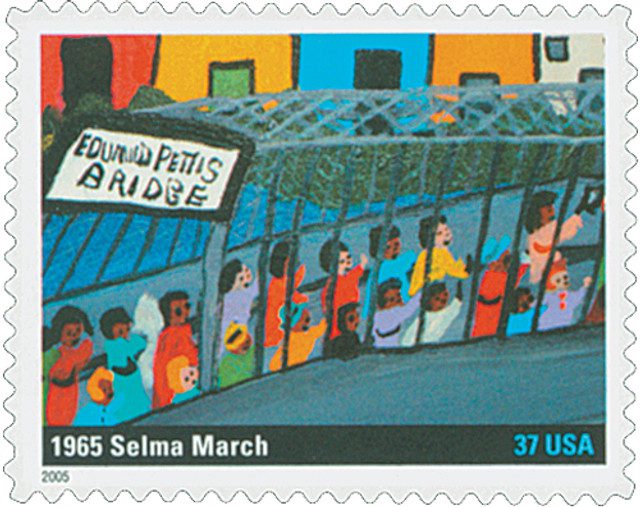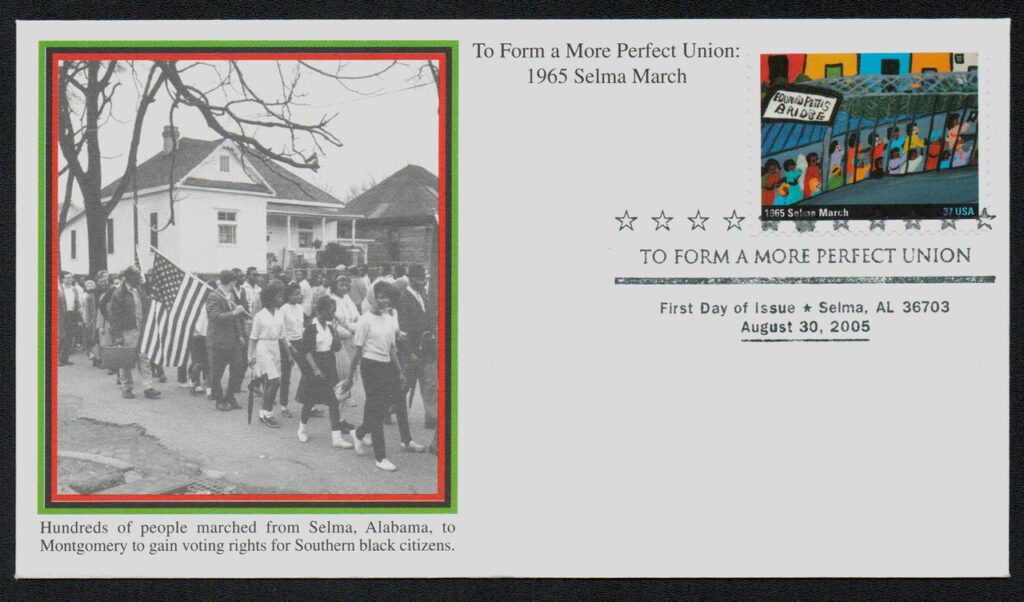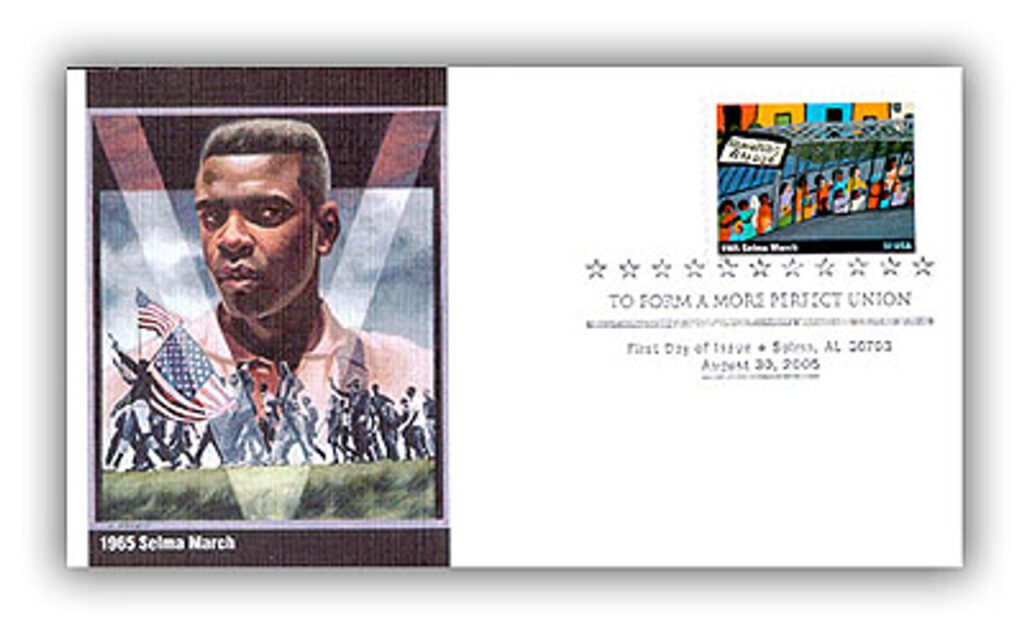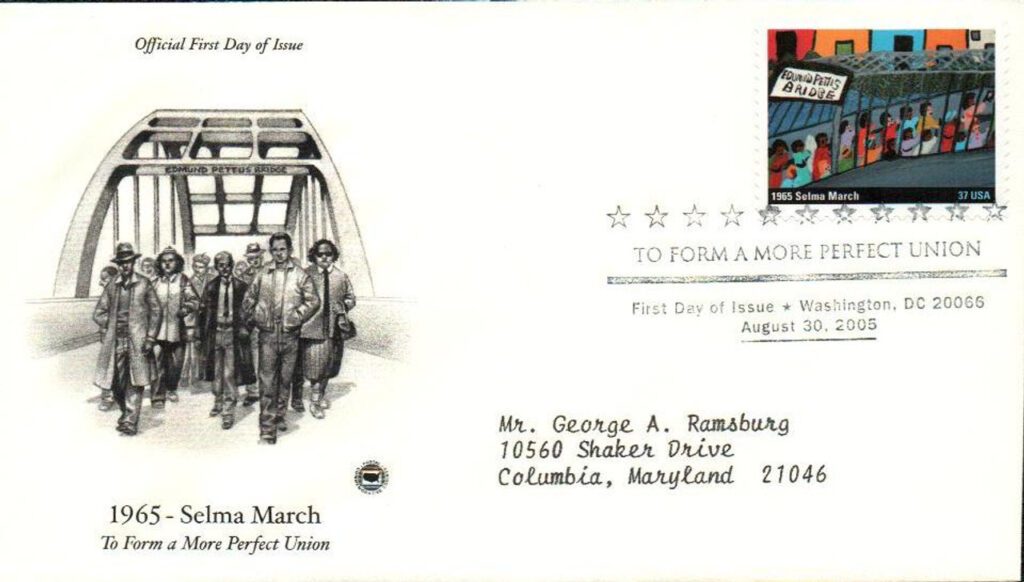
On March 21, 1965, Martin Luther King Jr. led the third (and finally successful) march from Selma to Montgomery, Alabama, to protest for voting rights.
The 15th Amendments to the United States Constitution granted black men the right to vote, and the 19th extended that right to all women. However, Southern registration boards used poll taxes, literacy tests, and other strategies to deny this right.
The murder of voting-rights activists in 1964 brought national attention to the issue. In 1965, Martin Luther King Jr. and the Southern Christian Leadership Conference (SCLC) traveled to Selma, Alabama, to fight for black citizens’ right to vote.
The SCLC demonstrations led to the mass arrests of hundreds of protesting students. For days, news media showed black children being led to jail. During one protest, police fatally shot a black man when who was protecting his mother from being beat by police. After his death, the idea grew for a procession to the state capital.
The first Selma March began on March 7, 1965, led by John Lewis and Hosea Williams (King was in Atlanta at the time). As the marchers crossed the Edmund Pettus Bridge leaving Selma, they were confronted by state troopers. The troopers refused to allow them to pass, and began fire tear gas, charging the crowd on horseback, and beating the marches with nightsticks. 17 marchers were hospitalized, with 50 more treated for injuries.. Scenes of club-wielding police beating marchers were broadcast around the world, as the even became known as “Bloody Sunday.”
King hurried to Selma and, two days later, led 1,500 protesters in a second march. However, because a court order has been issued forbidding a march from Selma to Montgomery, King stopped the march on the Edmund Pettus Bridge and led a prayer, before turning back to avoid a confrontation with troopers. That evening, several local whites attacked and beat James Reeb, a white minister from Boston, who has participated the march. He was hospitalized, and died two days later. A week later, with the restraining order lifted, the full march was scheduled for March 21.
In the meantime, President Lyndon Johnson offered his support, lobbying for passage of the new voting rights act he was introducing to Congress. He also ordered US Army, National Guard, federal marshals, and FBI agents to Selma to protect the marchers. As planned, about 3,200 people left Selma on March 21. Through a stretch of two-lane highways, a court order limited the marchers to 300 people, so most returned to Selma that night. Over the next four days, the marchers traveled 54 miles, walking up to 12 hours each day and slept in fields at night. When the highway became four lanes again, buses and cars began ferrying supporters to rejoin the marchers. By the time they reached Montgomery on March 25, 25,000 people had joined them.
In front of the state capitol, King addressed the crowd and people watching the event on television. “They told us we wouldn’t get here. And there were those who said that we would get here only over their dead bodies, but all the world today knows that we are here and we are standing before the forces of power in the state of Alabama saying, ‘We ain’t goin’ let nobody turn us around.’” Others took the podium to thank the marchers for their dedication. Among them was Nobel Peace Prize winner Ralph Bunche, who said, “I earnestly salute every one of you for expressing by your presence here the finest in the American tradition; you are in truth the modern day ‘Minute Men’ of the American national conscience. You have written a great new chapter in the heroic history of American freedom.”

Three months later, President Johnson signed the Voting Rights Act of 1965. The act prohibited individual state restrictions that made it difficult – or impossible – for blacks to vote. The act was passed by large majorities in both houses of Congress and signed into law on August 6. Within months of its passage, a quarter of a million new black voters had registered. Within four years, voter registration in the South had more than doubled. In 1965, barely 100 African-Americans held any elective office in the US; by 1989, there were more than 7,200.
Click here to listen to King’s March 25th speech in Montgomery. And click here to read to Ralph Bunche’s speech.
| FREE printable This Day in History album pages Download a PDF of today’s article. Get a binder or other supplies to create your This Day in History album. |
Discover what else happened on This Day in History.






This is terrific and thank you for the links. The civil rights memorial in Montgomery seems to capture some of the emotion associated with the movement.
Unfortunately, the Supreme Court has canceled many of the protections of the Voting Rights Act of 1965. As a result, several states have enacted laws which make it more difficult for black voters to exercise their constitutional right to vote.
https://www.youtube.com/watch?v=yW2LpFkVfYk
The link Dom provides is nothing more than lies for the ongoing lies from those conspiracy wackos (the cow jumped over the moon type of nuts).
Getting a ID requires some sort of documentation; a birth certificate, marriage license or some other court document (i.e.: like long lost divorce decrees that WOMEN have to provide as proof for name change – which itself discriminates against ALL females). And I don’t know any government agency that gives it out free of charge, so the cost of which is a “pole tax” in order to vote!
As explained in the article, voting skyrocketed when the right to vote became law. Since the supreme court’s decision it has once again become harder to vote which is based on another lie, “voter fraud” of which there is none.
And this doesn’t even begin to touch on “jerry-mandering” but that’s a subject for another time.
Timm, you neglected to mention, gerrymandering. The red states draw weird voter districts to group most of the blacks into one district, so that the other districts will elect white men.